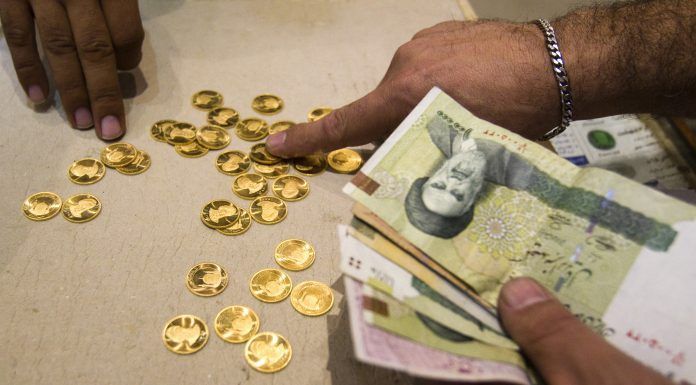Iranian rial dropped to 133,000 against U.S. dollar on February 19. The rial has also steadily fallen in value against other foreign currencies since February 16. The exchange rate in the open market were 149,000 rials to a euro, 163,000 rials to a British pound, 25,300 rials to a Turkish lira and 36,050 rials to a UAE dirham.
Tehran’s gold market also experienced a price increase. An Iranian Bahar Azadi coin (weigh 8.13 grams, pure gold content 7.317 grams) fetched $1.072, more than doubling in price since March 2018.
Meanwhile, the government has, in a transparent move, accused unlicensed exchanges and black-market dealers of manipulating the market and raising rates.
Tehran chief of the police Brigadier-General Hossein Rahimi said his officers had arrested 20 dealers in Tehran metropolitan area. Commander Rahimi also warned that police would pursue and arrest dealers who sell foreign currency online at artificially inflated rates.
Mr. Rahimi said: “There are 190 dealers in prison. We have shut down almost all unlicensed currency exchanges and rounded up most of the street dealers in Tehran.”
It is abundantly clear that a few unlicensed exchanges and street dealers cannot manipulate the foreign currency market. The public does not fall for the government’s transparent attempt to blame small-time dealers for its failure to control market and exchange rates.
Several events might have contributed to a sudden drop in the rial’s value including a two-day summit in Warsaw, Poland which resulted in uniting 63 countries against the Islamic Republic, Iranian government’s 2019 budget deficit of nearly $2.5 billion and Expediency Council’s review of the Palermo bill (United Nations Convention against Transnational Organized Crime, UNTOC.)
Some people believe by refusing to release foreign currency into the market; the government is trying to scare those who oppose the Financial Action Task Force on Money Laundering (FATF) to join the treaty and avert a crisis in the country.
The FATF has given Iran until the end of February to sign up to its article on Combating the Financing of Terrorism CFT. Iran has approved two of the FATF Recommendations. The Expediency Council has yet to approve The UNTOC and the CFT.
Meanwhile, the Expediency Council for the third time on February 16 did not come up with a definite ruling on whether it supports Iran’s joining the Palermo bill.
Translated from Persian by Fardine Hamidi


